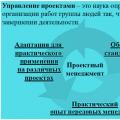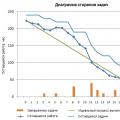Organization of the project manager
Specially appointed people have a key project role, position and profession in the company. They are selected from a special group of candidates and become responsible resources for project tasks. Organizationally and formally, the center of competence and the center of project architecture is the figure of the project manager, or, according to the business customs of Russian business, the project manager. In this article, we will analyze approaches to the formation of requirements for the portrait of this manager, his main functions and possible errors.
Project manager functions
Under the project manager, we consider a person responsible to the management of the company for achieving the goals, endowed with the authority to do this, sufficient to solve the accepted tasks in the face of restrictions and risks. International organizations that publish standards in the field of PM also pay serious attention to the requirements for competence, professional and personal qualities of project managers. Thus, the IPMA association, which also includes the Russian Federation, has issued a standard for international requirements for the competence of project managers (PM ICB IPMA Competence Baseline). The last 3rd version of the standard was published in 2010, the ICB included a total of 46 competencies in various areas, divided into groups of technical, behavioral and consensual competencies.
On the basis of ICB, SOVNET developed the NTK standard (National Requirements for the Competence of Project Managers). Certification passed according to this standard is recognized by IPMA. The PMI Institute, to a lesser extent, but still pays attention to this issue. This standard emphasizes the growing role of the project manager in addressing the strategic objectives of the business. In PMBOK, the emphasis is not only on the knowledge and skills of the PM, but also on his personal competencies and leadership qualities. The following is an extract from the PMBOK Guidelines regarding the project leader and their areas of competence and responsibility.

Extract from the PMBOK Guidelines on the role and competencies of the project manager
Becoming a professional project manager at the first stage is not difficult. It is enough to have a higher economic or even secondary vocational education and get some managerial experience. Depending on the organization, experience requirements range from 1 to 5 years. In recent years, certification of specialists according to two international standards IPMA (IPMA-SOVNET) and PMI has been gaining popularity. Certification significantly increases not only the competence of a manager, but also his professional status.

Extract from the typical job description of the Republic of Moldova: Section "Job Responsibilities of the Project Manager"
The above is an example of a project manager job description for a mid-range manufacturing company. It should be noted that the job responsibilities of the RM are largely determined by the organizational form of project implementation, their type, the scale of the organization and the branch of its activity. The functions of the project manager of a commercial organization are divided into seven groups, the outline of the content of which is placed below.
- Functions based on the fulfillment of the task of strategic management.
- Providing communication between company management and project implementation.
- Reproduction of the project management system.
- Development of a project plan.
- Organization of project execution.
- Control and analysis of the progress of implementation.
- Functions related to closing a project.

The scheme of the functional composition of the project manager
What should management be aware of?
As you know, any interested person can act as the initiator of the project. Often they are the customer, functional managers or the head of the project office. The curator appointed by the top management of the company will have to become the closest leader in the project environment and devote significant time to project management. It is to him that the customer gives the authority to allocate resources, support the project and transfers responsibility for the success of this unique task.
The duties of the curator include the development of the project charter, the regulation of controversial issues, the approval of changes to the design parameters, and much more. Two leaders (curator and project manager) make up its management team. One of them operates inside the implementation of the task, and the other - above it in the task-target business hierarchy. Real events show that it is not always possible to act flawlessly, especially when project management is just unfolding in a company, and managers do not yet have sufficient experience. Even if the methodology is “studied”, job descriptions are developed and functions are described, no one is immune from mistakes.
Based on experience, it is safe to say that the main design errors should be divided into two large parts: the flaws of the higher management in relation to the project and the errors of the project manager. Typical mistakes of the company's management at the stage of project initiation, planning and support are collected in a separate table presented below.

Classification table of company management errors in the project
The main share of the curator's mistakes falls on the initiation stage, including procedural difficulties in choosing a PM and setting a task for him. It is often difficult to fully comply with the routine initiation procedures in Russian realities. The powerful “I want” is of great importance. We have repeatedly seen positive effects if the protocol was followed from the very beginning. When this was possible, then, regardless of the scale of the project task, success immediately began to "glimpse" ahead.
If the goals of the project are not formulated, not commensurate with the company's strategy, if the prerequisites are not expressed and the charter is not developed, the chances that a more or less serious project will reach a result are small. The project manager, even being in the status of a candidate for this role, must necessarily be involved in project management at the initiation stage. This is a very important rule that needs to be followed.

Block of management errors at the initiation stage
Possible omissions of the project manager
The project manager, included in the staff of the enterprise, in his work relies on the job responsibilities and functions prescribed in the instructions. Another thing is a project manager who performs a role-based installation, while being an employee of a functional unit, for example, the marketing department. In his usual practice, such a specialist or even a leader performs functions related to the marketing and advertising mix. Such an employee cannot become a full-time PM overnight.
Regardless of the functional link, the project manager, starting to manage, must consider the requirements and regulations of the charter, which reveal to him the content, goals, results, product and criteria for the success of the project. The charter is the main document that guides the project manager. Typical PM mistakes are presented to your attention below, among them the second type is considered errors in interaction with the curator.

Classification table of RM errors in the project
Project management requirements impose on the PM a serious responsibility not only for the results, but for the substance and content of his actions as a resource and leader. Negotiations with the curator are an important moment in setting and accepting a task. The curator needs to meet the requirements of the minimum level of such project constraints as "budget" and "terms" while maximizing the content (quality) of the result.
The project manager, in turn, needs complete information on the terms of the project task in order to measure all possible risks and the sufficiency of the proposed resources. And he is free to refuse if the resource base is small and the risks are too great. These are the requirements of the task paradigm. The project manager, although he is on staff, may well be aware that the project will not be able to handle such complexity.
Honor and praise to RM for finding the courage to refuse in such a situation. At this point, the key risk of the project is eliminated and the curator ceases to “hopefully” that the project is being implemented. The project manager at the same time ceases to agree with the proposal, according to which he "as if solves the problem." Eliminates potential ambiguity between negotiating parties. Project management may soon be given a new impetus with the best candidate, but the task will not be ruined.
The freedom and responsibility of the project manager is a guarantee of managerial clarity that the result of the unique task being performed will take place. Pressure or neglect of such an important procedure as setting and negotiating the task and its conditions is not acceptable. The conditions of the task are comprehensively deployed in the project charter. It lacks only a business plan, but has everything so that the PM can make an informed decision.
Task and personal context of PM success
Everything that has been said so far regarding the omissions in setting tasks for the project manager can fully apply to him himself. When starting to manage a team, the PM must select performers for it. Recruitment and selection proceed on the basis of the same task doctrine. In the working group, then in the project management team, the decomposition of the project task into subtasks reaches its optimal level. If the format is not followed and project activities are not formulated with quantitative parameters, there will be no success.
If only one line-up of candidates was considered during the selection of the team (usually it is), then this is not a violation. But! If the project manager succeeds in building the team formation process in such a way that there is a minimum competition, even with one extra candidate for just one place, the quality of the team will improve dramatically both in composition and in its mood. You should not show people how much the company needs them. This is “my want” of business management: “if you want, take it”, “if you don’t want it, I’ll find another”!
Often this seems impossible due to the lack of good performers. However, this is an illusion that PMs often have. The requirement to meet the terms of the project's time and budget constraints can also be effectively met in the course of task setting in the team. This is done quite simply. At the meeting of the project team, a competition is held between conditional units of 2-3 participants. Each link is instructed to find at least three ways to solve a subproblem. Then the presented solutions are discussed by the whole team, the links change places and again look for new solutions. The best way is translated into task format.
For some reason, in many sources, the personal-psychological difficulties of the project manager are not accentuated. However, there is reason to believe that this is a very important aspect of the PM's activities for its success. Getting a modern education in project management is not so difficult for any economist, technologist or line manager. And changing personal stereotypes, especially if a person has acted as a performer for a long time or, on the contrary, as a “big boss”, is not as easy as it seems. Surprisingly, it turns out that being balanced, being able to ask for help without fear, learning from a young knowledgeable colleague is very valuable.
In this article, we examined the requirements for professional and personal qualities of PM, their job responsibilities, basic functions and typical mistakes in project management. We analyzed the approaches of international and Russian standardization systems to these aspects of management. The main shortcomings and omissions on the part of curators and project managers have been clarified. It seems to me that in the context of the growing importance of project management in modern business, the relevance of this topic will only increase.
 Discounted payback period
Discounted payback period Methodological aspects of project management
Methodological aspects of project management Scrum Development Methodology
Scrum Development Methodology